
 |
 |
 #INTHEAIREVERYWHERE |
| Vol. 23 No. 2 | Wednesday January 17, 2024 |
| |
 |
Latest Boeing B737 Max fiasco with a door plug blowing off in flight ending up in someone’s backyard, brings even further sadness to the continued decline in reputation for a company once regarded as standard of the world. For the fifth consecutive year, Airbus in 2023 delivered more aircraft and landed more orders than Boeing, reflecting the company's ongoing challenges most notably with the 737 Max. As bad as it is for Boeing, it could have been a lot worse. That brand new Alaska Airlines B737 Max 9 midair blowout scared the hell out of everyone, but no one was hurt. Taking a positive approach, we all hope, is we can learn and expect an even tighter and better Max 9 in the future. As of December 2023, the 737 MAX has 4,783 unfilled orders and with maybe 6,500 airplanes of the type in various series already in service. The world counts on Boeing 737s that, as you read this, represent a quarter of the total global fleet of large commercial jets flying today. For air cargo there are numbers of re-engineered B737s being converted to freighters. Since Boeing got its 737-800BCF program approved in 2018, about 150 737-800 freighter conversions have entered service. At last count, eight airlines operate fleets with more than one 737-800 freighter conversion. Started thinking about how cargo conversions demand the need to install advanced systems including a brilliantly superior cargo door. Aeronautical Engineers Inc. (AEI) 12 pallet B737-800SF Freighter Conversion stands out among best in the world at that kind of work right now. AEI's cargo door has earned a reputation of being the most robust and reliable in the conversion industry. The AEI engineered cargo door like the one installed on this Ethiopian Cargo beauty is hydraulically operated and actuated from the inside of the aircraft by a independent system. Hydraulic pressure is available from two sources: a 28VDC electrically operated hydraulic pump or a manual hand pump. The door control and manual pump are located on the 9g barrier, allowing a single person to operate the door manually. Wonder if the big thinkers at Boeing are or should be talking to AEI? Based in Miami, Florida for more than 60 years, AEI provides advanced engineering solutions for aircraft owners and operators, and maybe builders? When you think about it more cargo engineering input into passenger aircraft can't hurt especially the next time the world needs them. GA |
|
|
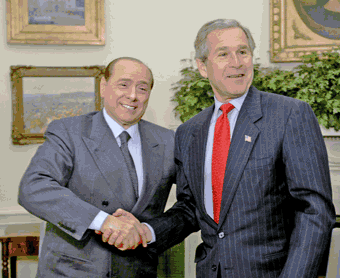 This
is the second part of the article about Italy and this part will be mainly
focussed on Italian politics in transport and logistics. All this handsomely
represented in Rome in November 2023 at CONFETRA’s
event. This
is the second part of the article about Italy and this part will be mainly
focussed on Italian politics in transport and logistics. All this handsomely
represented in Rome in November 2023 at CONFETRA’s
event. Let me go back to the issue of Italian politics with an old Italian joke, unorthodox as this might be. The joke tells you a long story in short. It was popular many years ago and this is how it ran: why do Americans have Bush and we have Berlusconi? Because they chose first! So, how many times would we want to have, or to have had somebody else on the job? I guess nobody would be ever satisfied, but there are various degrees of (dis)satisfaction and in the last three decades in Italy we have surely descended a certain number of steps. In the first part of the article we were explained that we “are in a wonderful country”: Italy. The Italian peninsula recalls indeed the shape of a boot and this is the popular way Italians call it: lo stivale, i.e. the boot. What remains to be seen is whether we shall get the Seven Leagues’ Boots or we shall . . . get the boot instead. With this kind of disposition in mind I went to Rome recently for CONFETRA’s extremely well organised “public assembly”. The Confetra gathering, dedicated to the theme of “Transition and Sustainability: Challenges and Opportunities, Visions and Realities”, took place in Rome on November 14th in the evocative setting of the Roman Aquarium, a place I had so far completely ignored, which boasts in fact considerable grace. Difficult to shine for beauty in a city like Rome, but I think this one does. Much political talk in the peninsula involves the ability to spend the funds assembled post-Covid in an effort to promote the transition to a greener and digital economy. What follows is a short extract of the deliberations and some of my own observations.  Confetra’s
President Carlo De Ruvo (right) proposed addressing the issue of
transition starting from a national project for decarbonisation in the urban
distribution of goods. Obviously, in order to do this, some fundamental
principles are required to then build ad-hoc policies to reduce the lack
of consistency in urban mobility rules (technical criteria, pricing, access
times for loading and unloading, etc.) De Ruvo also addressed some issues
that affect the competitiveness of the sector, such as those linked to different
degrees of autonomy in different regions, port governance and competition,
the need for a rapid solution to the issue of the Alpine crossings, with
a common council including all stakeholders. Confetra’s
President Carlo De Ruvo (right) proposed addressing the issue of
transition starting from a national project for decarbonisation in the urban
distribution of goods. Obviously, in order to do this, some fundamental
principles are required to then build ad-hoc policies to reduce the lack
of consistency in urban mobility rules (technical criteria, pricing, access
times for loading and unloading, etc.) De Ruvo also addressed some issues
that affect the competitiveness of the sector, such as those linked to different
degrees of autonomy in different regions, port governance and competition,
the need for a rapid solution to the issue of the Alpine crossings, with
a common council including all stakeholders.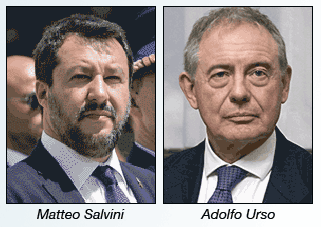 The
Minister of “Business and Made in Italy” Adolfo Urso emphasised
how his office, through a budget of 12 billion euros in two years, was preparing
to implement a transition plan to support both green and digital transitions.
Rome University
professor Valeria Termini took stock of the timing and problems of the transition
process with a distinguished and well informed analysis, also in light of
the objectives set at European level. The Vice President of Confcommercio
Donatella Prampolini invited all the institutions to operate with healthy
pragmatism so that sustainability and transition processes took account
of the real situation from an economic and social point of view. The
Minister of “Business and Made in Italy” Adolfo Urso emphasised
how his office, through a budget of 12 billion euros in two years, was preparing
to implement a transition plan to support both green and digital transitions.
Rome University
professor Valeria Termini took stock of the timing and problems of the transition
process with a distinguished and well informed analysis, also in light of
the objectives set at European level. The Vice President of Confcommercio
Donatella Prampolini invited all the institutions to operate with healthy
pragmatism so that sustainability and transition processes took account
of the real situation from an economic and social point of view. 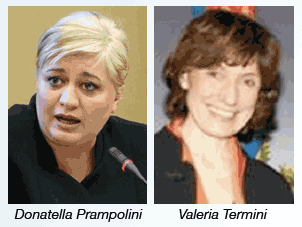 The
debate was concluded by the Minister of Infrastructure and Transport, Matteo
Salvini, who illustrated the investments decided by his office in terms
of sustainability, while at the same time sharing the concerns of the production
sectors. These were said to fear the acceleration in the timing of the related
transition processes, and this would “risk producing more damage than
benefits.” If you wish to listen to the sirens recommending the status
quo as your best option, you can surely agree on the content of his speech. The
debate was concluded by the Minister of Infrastructure and Transport, Matteo
Salvini, who illustrated the investments decided by his office in terms
of sustainability, while at the same time sharing the concerns of the production
sectors. These were said to fear the acceleration in the timing of the related
transition processes, and this would “risk producing more damage than
benefits.” If you wish to listen to the sirens recommending the status
quo as your best option, you can surely agree on the content of his speech.
My understanding was different, Mr. Salvini is a political creature that has a flair for the gut feeling of the audience: the man always declares his intentions to be so cautious and considerate, appears to speak in the most obvious, untested common sense, so that you are inclined to believe any kind of fantasy he spells out. His sermon always evokes the wonder or the fairy tale and the charm of illusion. Unfortunately, when you wake up, your disappointment is the only legacy you are left with. And in this case, Minister, doing nothing “lest you did more damage than good” is just not an option. Italian infrastructure is ailing, innovation is a word in the dictionary and the Italian entrepreneur often carries a Swiss passport. I think it is really difficult “to do more damage” than this . . . Italian politicians have tried (and Salvini was perhaps still trying with his speech) to defend internal combustion engines in Brussels for the last five years: in the meantime, our car manufacturing industry, reassured by this appeasing dream, has lost the rapidly evolving global markets, if not the industry itself. We have tried to promote biodiesel along with these negotiations, so that we could help our farmers with a by-product from Italian farms, but we lost, without a plan B. We shall figure something out: Italians are not only hard to please, they are also hard to die, but right now we are left with nothing. I am not sure that our governors actually understand the pervasiveness of this crisis. In his speech Mr. Salvini promised a high speed train between Palermo, Milan and beyond, but he was oblivious of the appalling state of the Italian infrastructure that has been paid one hundred times over by our expensive motorway tolls, after having been paid to build decades ago by our taxes. Where all that money goes is a mystery indeed. In Switzerland you pay once a year the vignette, a levy that is equivalent to what Italians pay every time they drive to the next city: all this monumental mobility outlay seems to be zapped into nothingness. Not that the Minister of Transport and Infrastructure felt obliged to give any reasonable explanation; what are we supposed to think? To his credit you must say that Mr. Salvini is not different from his predecessors, who were similarly frugal in considering these issues and in giving explanations. Suffice it to say that we have talked about a tunnel between Italy and France for at least thirty years, no functioning tunnel is in sight. The Swiss have already built two of the same in the meantime. We talked and talked, a minister in charge even opposed the already decided project, what have we at hand? A big round and comforting zero. The tunnel is still in the area of wishful thinking more than thirty years after its plan. Let us not even get into the issue of derv and gasoline excise, which is another pile of money that could feed and clothe a medium size country. At this point somebody could ask: what about earmarking? Sorry, this is like the original sin in this part of the world. This is not America. The money collected on the roads trickles down somewhere else and nobody can give a rational explanation other than saying (in Italian) that “the blanket is small”, meaning that the fiscal income is insufficient. Would you call this “the wonderful boot”? One could be led to think that the enormous outlay of money coming from the vehicles on the roads actually allows Italian to benefit from very low income taxes, able to attract new, promising business. Well, yes and no, the Italian tax office recently observed with a frown that only about half of the country actually pays taxes, whilst the rest manage to get anyway without doing so one way or another. So there is quite a lot of business in Italy, and some manage to avoid paying high taxes, the only issue is that most of this tax “relief” is illegal, illicit or immoral, as the famous quote goes. The rest of the businesses flee the country where the lemons blossom, in a quote by Goethe, as fast as they possibly can, so that most of our historical brands no longer exist or languish in despair. The number of Italian brands and enterprises that have become “economic migrants” is endless. You may say I am too harsh, in particular on our politicians, but in my mind half of the problems we have at hand are self-inflicted and originate from our deep rooted inclination to believe and rely on prophecies that never come to fruition, as the famously promised “Ponte sullo Stretto” i.e. the bridge between Sicily and Calabria. This has been a cliché for a few decades, considering we have been talking about it since I was a child, but now we are told the bridge will be extracted from the kingdom of fairy tales and will be actually built. In evoking the myth of the “bridge”, Mr. Salvini was following another politician’s example, Berlusconi, who had been vocal about the bridge to Sicily years ago. With similar farfetched promises Berlusconi had won the national elections by promising “one million jobs” five days ahead of 2001 polls and by signing a contract in front a TV camera. As we know, Berlusconi has “symbodied” the Italian businessman of charm, become successful politician, with a comparatively excited private life. There is still quite a live debate in the country on how his legacy should be understood. In my view it was a fairy tale: one that did not contain a moral.
Shall we drive to a close of this zigzagging picture of Italy, Italians, its politicians and its logistics landscape, ushered in by the Alitalia saga? Italy is a wonderful country that is capable of truly great achievements. It is not difficult to see that the Italian contribution to global culture, art and philosophy is unique, but Italians have made several mistakes in different historical periods, in particular with Mussolini and Fascism. So how can we steer the boat to safer shores in our future? 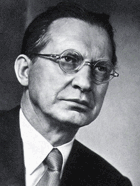 Let me quote Alcide de Gasperi’s speech
in Paris in 1946, after Italy had lost the war and was reduced to a pile
of rubble and financially broke: “I speak in this global meeting and
I feel that everything, except your personal courtesy, is against me: it
is above all my qualification as a former enemy, which puts me in the shoes
of the accused, having arrived here after the most influential of you have
already formulated their conclusions in a long and laborious process. [
. . . ] I have the duty [ . . . ], speaking
as Italian, to defend the vitality of my people, but I feel the responsibility
and the right to also speak as an anti-fascist democrat, as a representative
of the new Republic, which, harbouring in harmony the humanitarian aspirations
of Giuseppe
Mazzini, the universalistic conceptions of Christianity and the internationalist
hopes of our workers, is all directed towards that lasting and reconstructive
peace that you seek and towards that cooperation among peoples that you
have the task of establishing.”
Let me quote Alcide de Gasperi’s speech
in Paris in 1946, after Italy had lost the war and was reduced to a pile
of rubble and financially broke: “I speak in this global meeting and
I feel that everything, except your personal courtesy, is against me: it
is above all my qualification as a former enemy, which puts me in the shoes
of the accused, having arrived here after the most influential of you have
already formulated their conclusions in a long and laborious process. [
. . . ] I have the duty [ . . . ], speaking
as Italian, to defend the vitality of my people, but I feel the responsibility
and the right to also speak as an anti-fascist democrat, as a representative
of the new Republic, which, harbouring in harmony the humanitarian aspirations
of Giuseppe
Mazzini, the universalistic conceptions of Christianity and the internationalist
hopes of our workers, is all directed towards that lasting and reconstructive
peace that you seek and towards that cooperation among peoples that you
have the task of establishing.”This speech, which sounded as atonement to the ears of those who had been hurt by our soldiers during the war, contains the essence of the agreement that managed to resurrect Italy from its ashes, precisely as professor Valeria Termini mentioned in her speech in Rome, albeit without mentioning Alcide De Gasperi: humanitarian, universal aspirations and the active concurrence of those who actually worked. This is the recipe that is now missing: today we hope to close our doors to foreigners, we harbour the most dangerous parochial belief instead of the universal hope for resurrection and even have scarce, if any consideration for the rest of humanity. This is precisely the feeling that our politicians should try to mitigate and cure, certainly not encourage in their proclamations. On the other side, in 1946 Italy took De Gasperi’s words literally and started a path of resurrection that granted a speedy recovery (also thanks to the timely, conspicuous Marshall Plan) that lasted many decades and ensured our present day’s relative affluence. This was done through a constructive competition between the Catholic and Communist parties and the humanitarian aspirations of the Liberals and all those in between. I am sure most of the politicians who made history in this country in that period had big egos, as it often happens with these personalities, but they also measured their success in the progress of the country. This important point is surely not on top of the list of our contemporary politicians, who prefer the futile bait of their selfies and delight in monologues on social media rather than answering questions. I still believe that we can insert human, universal and productive goals in the minds of our fellow countrymen and women and land them in a fairy tale: we will then surely get the Seven-League Boots and jump ahead of competition in no time. Competition is not our enemy: it is our incentive to win the race. In the end, there are only three elements in this recipe for the resolved future of Italy: Work, Work, Work! Thanks for reading this long article. If you came to this point you have made me very happy, thank you very much indeed. I hope this contributes to showing that Italy can still make it if it turns the page of seclusion that it has unwittingly embraced in the last few years. Marco Sorgetti |
 |
If you want to learn about August Martin, the great air cargo pilot who flew for Seaboard World Airlines during the 1950’s, the name August Martin as an internet search, most often comes up as “August” 28, 1963, the day “Martin” Luther King whose birthday we celebrated this past Monday delivered his never to be forgotten “I Have A Dream,” speech at the Lincoln Memorial in Washington, D.C. August Martin was a gentle man, who would be remembered in history as the first African American to serve as Captain on a U.S. scheduled flag carrier. Put another way, before “Augie” as his friends called him, there had never been a black airline captain on the bridge of any U.S. airline. Although he flew for other carriers, including EL AL Israel Airlines and a company called Buffalo Skylines between 1946 and 1955, it was Seaboard World Airlines, an air cargo company, that hired Augie, breaking through a glass ceiling in American aviation. Air cargo put a great aviation pioneer, who happened to be black, in the left seat. August Martin, who was born in 1916 had aviation blood in his veins. He worked all his life to be a pilot, training as a youngster to fly small prop jobs and later during World War II as a front line Mitchell B26 bomber pilot. He also took training at the Tuskegee, Alabama base, which spawned the legendary black pilots who gained fame as The Tuskegee Air Men. While awaiting his big break Augie worked as a stevedore on the New York docks to make ends meet. But when SWA came a-knocking, August Martin was ready. For the next thirteen years Martin piloted the legendary all-cargo aircraft of SWA, including the Lockheed Constellation, Canadair CL44 swing-tail freighter, Douglas DC-4 and DC-6 among others. August Martin was not just about breaking through for himself. Augie also gave back big time. Often, he would donate his off time and vacations, flying supplies to the impoverished in Africa, and other points of emergency and need around the world. On July 1, 1968 August Martin was killed aboard just such a flight when his cargo-laden aircraft crashed in a blinding rainstorm as he attempted to land in Biafra, Africa. Today, in modern air cargo circles not much is known or said about August Martin. You can find this children's activity book centered on his life on Amazon, but sadly that is about it . . . Can't International Air Transport Association (IATA) that has awards and recognizes outstanding performance, or The International Air Cargo Association TIACA Hall of Fame, or The Airforwarders Association and some others, open their hearts and honor Augie? Geoffrey |
If
You Missed Any Of The Previous 3 Issues Of FlyingTypers Access complete issue by clicking on issue icon or Access specific articles by clicking on article title |
||
 Vol.
22 No. 44 Vol.
22 No. 44Saigon Never Bygone Chuckles for December 18, 2023 Letter To Santa 100 Years To Hel & Back Up On The Roofstops |
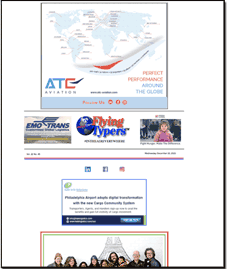 Vol. 22 No. 45 A Christmas Story |
|
Publisher-Geoffrey Arend
• Managing Editor-Flossie Arend • Editor Emeritus-Richard
Malkin Film Editor-Ralph Arend • Special Assignments-Sabiha Arend, Emily Arend |
Send comments and news to geoffrey@aircargonews.com
|